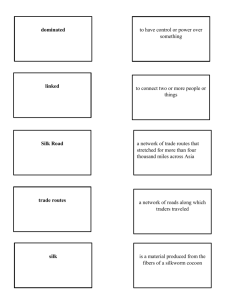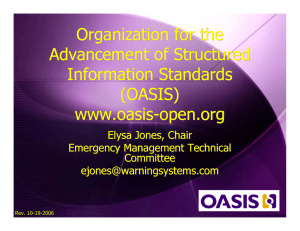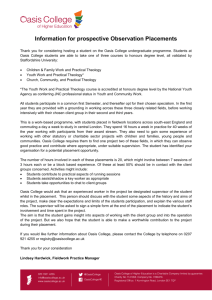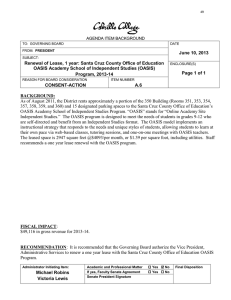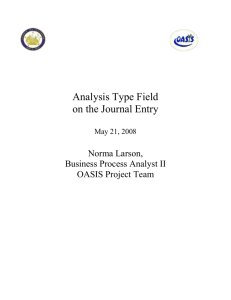OASIS Recent Technical Developments John Borras
advertisement
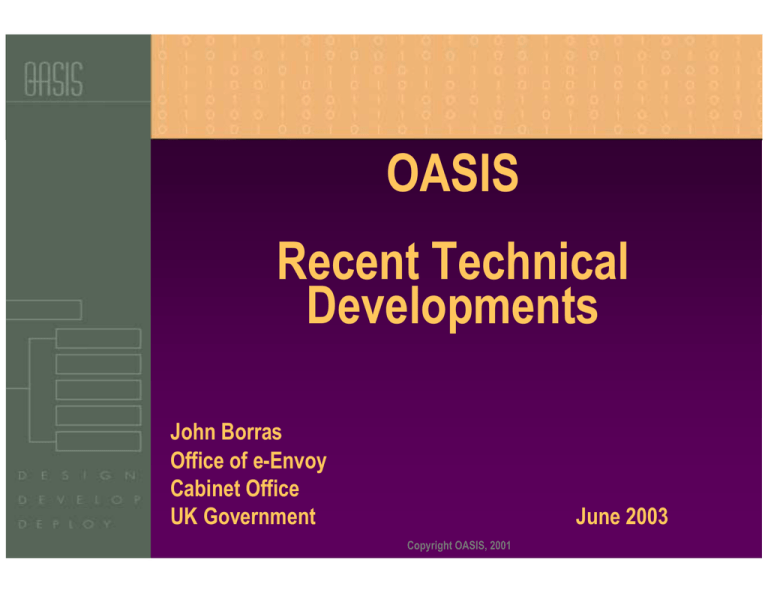
OASIS Recent Technical Developments John Borras Office of e-Envoy Cabinet Office UK Government June 2003 Copyright OASIS, 2001 Agenda • What is OASIS? • Which Standards? • Emerging technologies • E-Government Technical Committee Copyright OASIS, 2001 OASIS OVERVIEW OF ORGANISATION http://www.oasis-open.org Copyright OASIS, 2001 Mission OASIS drives the development, convergence & adoption of e-business standards. Copyright OASIS, 2001 Overview • OASIS is a member consortium dedicated to building systems interoperability specifications • Members of OASIS are providers, users and specialists of standards-based technologies – Include organisations, individuals, industry groups and governments – More than 500 members • International, Not-for-profit, Open, Independent • Successful through industry and government wide collaboration Copyright OASIS, 2001 OASIS Value • Ten years demonstrated success • Neutral and independent • Technical and procedural competence • Worldwide visibility and outreach • Close coordination with peer standards organisations on a global level Copyright OASIS, 2001 OASIS technical agenda • The OASIS technical agenda is set by the members; bottom-up approach • Technical committees formed by the proposal of members • Attempt to cooperate and liaise with other standards organisations as much as possible Copyright OASIS, 2001 OASIS standards process • Standards are created under an open, democratic, vendor-neutral process – Any interested parties may participate, comment – No one organisation can dictate the standard – Ensures that standards meet everyone’s needs, not just largest players’ • Open to all interested parties • All discussion open to public comment • Resulting work is guaranteed to be representative of OASIS as a whole, not just any one vendor’s view Copyright OASIS, 2001 Which Standards? Copyright OASIS, 2001 “The best thing about standards is that there are so many to choose from.” Copyright OASIS, 2001 Difference between Specification and Standard • Specification is the technical document • Standard has agreement or approval under some process Copyright OASIS, 2001 Types of Standards • De Jure – Force of law; approved by one of the four recognized international standards organizations (ISO, IEC, ITU, UN/ECE) • Open – Approved under an open process where all interested parties have input, results are publicly viewable, etc.; the organization who developed the standard may be de jure or not. • De Facto – A standard only because of common usage, or by proclamation of a dominant vendor • Joint Commercial Venture – A specification resulting from the (usually private and secret) joint development work of a small number of vendors Copyright OASIS, 2001 Benefits of Using Standards • Increase efficiencies with information exchange – Eliminate re-keying of information • Unify and expand markets, allow markets to grow • Preventing/delaying product obsolescence – Proprietary solutions become obsolete quickly • More users/consumer choice – Vendors compete with value-add on top of interoperable core technologies rather than on incompatible technologies. Copyright OASIS, 2001 ROI to Vendors for Standards Participation • Avoid reinventing the wheel; save development costs for core technologies (by sharing with other participants) • Demonstration of leadership in the industry • Interoperability • Learning from other participants • Influencing industry direction • Early to market Copyright OASIS, 2001 How Should Standards Be Developed? • Participation should be open to all interested parties • Participants should include broad representation from a range of interested parties, including both vendors and end users • Standards should be approved by consensus or majority decision • Standards should implementable and implemented Copyright OASIS, 2001 How Can You as a User Influence Vendors? • Examine and understand standards that are pertinent to your industry • Help vendors understand interoperability needs • Help vendors understand what standards you rely upon today and in the future…and why • Participate in standards bodies that relate to your business practices • Do not purchase products from vendors who do not support the standards you need Copyright OASIS, 2001 Emerging Technologies • XML • ebXML • Web Interoperability Services Copyright OASIS, 2001 What is XML? • A way of making data: – Portable & reusable – Structured & unambiguous – Long lasting & valuable • W3C Specification based on SGML (itself an ISO Standards) – Language to describe rules for enforce document structure – Separates Structure from Presentation – Language for defining application-specific vocabularies Copyright OASIS, 2001 Information May Consist of 3 Things ! Data ! Information elements & values ! The "Content" ! Structure ! Relationship / location of information ! The "Markup" ! Presentation ! Formatting for easy consumption ! The "Style" Copyright OASIS, 2001 XML tells us "What" not "How" • XML describes what data "is" not what you want done to it – Separates "structure & naming" from "processing & format" Copyright OASIS, 2001 Major Benefits of XML • Information is described in a way understood by different types of systems • Documents & messages exchanged regardless of different environments • Leverages investment in legacy systems • Data easily reorganized & transformed into different delivery formats • Metadata can be included with content • Re-keying effort & errors are reduced • Business process changes enabled with less impact Copyright OASIS, 2001 ebXML The Global Standard for Electronic Business, and eBusiness Web Services Copyright OASIS, 2001 ebXML Provides a Standard Way to: • Exchange business messages • Conduct trading relationships • Communicate data in common terms • Define and register business processes Copyright OASIS, 2001 What does ebXML do? • Lowers the cost/complexity of electronic business • Facilitates global trade and puts SMEs and developing nations in the picture • Expands electronic business to new and existing trading partners • Converges current and emerging XML efforts • Eliminates dependence by supporting any language, any payload, any transport Copyright OASIS, 2001 Main ebXML concepts • Business Processes – Defined as models, Expressed in XML • Business Messages – Expressed in XML • Trading Partner Agreement – Specifies parameters for businesses to interface with each other – Expressed in XML • Business Service Interface – Implements Trading Partner Agreement – Expressed in XML • Transport and Routing Layer – Moves the actual XML data between trading partners • Registry/Repository - Provides a “container” for process models, vocabularies, and partner profiles. Copyright OASIS, 2001 Web Interoperability Services • • Tomorrow's web enabled e-business platform Built on XML and other open standards – XML – UDDI – WSDL – SOAP • An agreed set of vocabularies and interactions for specific industries or common functions • Coordination of cross-industry adoption of enabling infrastructure standards • resource management, security, identity, business process, etc. Copyright OASIS, 2001 e-Government Technical Committee Overview & Progress http://www.oasis-open.org/committees/egov Copyright OASIS, 2001 Committee Membership • Approx 120 to date • Governments – UK, USA, Finland, Denmark, Canada, Germany • ICT providers – small and large • Members of other TCs and other Standards Bodies • Many others Copyright OASIS, 2001 Committee Charter • provide a forum for governments internationally to voice their needs and requirements with respect to XML-based standards • provide a mechanism for the creation of best practice documents relative to the adoption of OASIS specifications/standards and other related standards within Governments internationally • promote the adoption of OASIS specifications/standards within Governments which could include the creation of implementation-oriented pilot projects to involve software vendors and participating government agencies to demonstrate the use of OASIS specifications/standards • work with other OASIS channels and other international standards bodies’ channels (e.g. XML.org for schema registry and/or information portal), to act as a clearinghouse of information related to applicable specifications/standards as well as activities and projects being conducted by Governments in the adoption of XML-based systems and standards Copyright OASIS, 2001 Deliverables • Recommended standards for delivery of eGovernment Services • Either existing standards, or enhancements of existing ones, or new ones, • Best Practice, Case Studies • Pilots • Specifications for support tools Copyright OASIS, 2001 e-Government : benefits of using Open Standards • More choice of products and suppliers • Less dependency on a single supplier • Avoid proprietary lock-in • Stability or reduction in costs • Accommodate future changes more easily Copyright OASIS, 2001 Thank you for your attention john.borras@e-envoy.gsi.gov.uk Tel no. +44 (0)20 7276 3101 http://www.oasis-open.org Copyright OASIS, 2001
